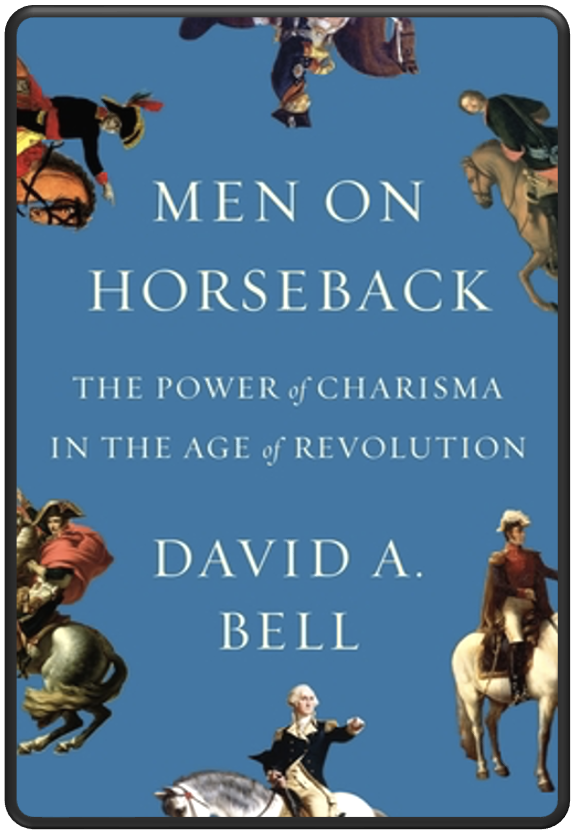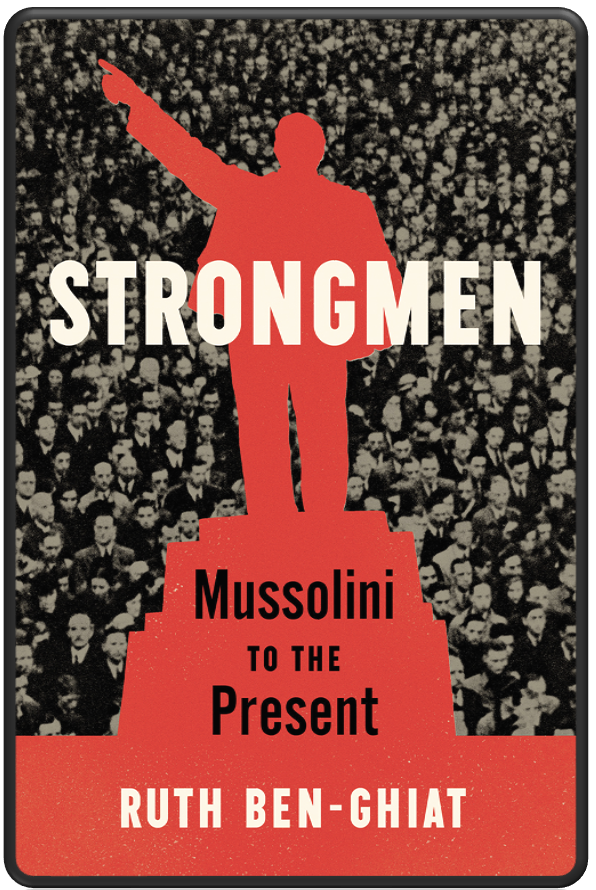
David A. Bell is the Sidney and Ruth Lapidus Professor in the Era of North Atlantic Revolutions at Princeton University. His book, Men on Horseback: The Power of Charisma in the Age of Revolution, documents the political influence of military leaders on both sides of the Atlantic during the 18th- and early 19th centuries, and defines them as a type.
The “Age of Revolutions,” a fifty-year stretch roughly spanning 1775-1825, was an era defined by the charismatic leadership of great men. More than that, as David Bell frames the period, it was a time when ordinary people could participate in the historic dismantling of old institutions, the fresh construction of new ones, and the broad expansion of human freedom on the way, all beneath the oversight of a few exceptional figures. Bell’s exemplars, including George Washington, Napoleon Bonaparte, Toussaint Loverture, and Simón Bolívar, hold several important qualities in common. Each was a military leader renowned for his talent, strength, and courage; each was hailed as a savior or redeemer of his country; and each was subsequently recognized as a founder of something new, a father to his people, who ultimately made the transition from military to political leadership. Bell travels with each figure as his reputation is built, identifying the pivotal events and helpful embellishments that lent themselves to an immortal reputation in every case.
Consider Washington, for example, who was the first of the era proper, and his revolution its inaugural. The glorious year of 1776 was anything but for the American general, whose frequent defeats and retreats were eventually formalized into a “war of posts” intended to annoy the redcoats without subjecting the Continental Army to any one final and decisive collapse. Observing this regress in October, John Adams complained to his wife that “in general, our generals were out-generaled.” There was bitterness and intrigue within the chain of command as well, as some of these generals—like Joseph Reed and Charles Lee—questioned and conspired against their chief. Later, when great victories were finally won, it would be others—like Horatio Gates at Saratoga and Nathanael Greene in the South—on the field. But none of this mattered to the American people, who consistently celebrated Washington via parades marched, songs composed, and towns named in his honor. He was a new type of leader for a new era and a new form of government—not a divine monarch, but an ordinary man, elevated by extraordinary virtues and crowned by acclamation.
For the American people, Washington’s bravery, honor, and commitment made him the perfect avatar of a republican admiration that they were already enthusiastic to confer. In such a context, the hero’s heroism is largely a product of his audience’s fawning attention, radiated by them upon him rather than the opposite, and so susceptible to abuse. As early as 1777, with the cult of Washington already at fever pitch, Adams expressed concern and probably more than a little jealousy. “I have been distressed to see some of our members disposed to idolize an image which their own hands have molten,” he said to his colleagues in Congress. “I speak here of the superstitious veneration which is paid to General Washington.” When the war was won—very largely thanks to the French—Washington declined the opportunity to rule as dictator, an astonishing relinquishment of power that he would reprise with flourish later, after his second term as president. (Garry Wills has thus referred to Washington as “a virtuoso of resignations.”) Though his countrymen would immediately cite his humility and grace as yet further reasons to adore him, their adoration might just as easily have conceded him the presidency for life if he had claimed it.
In broad outline, then, Washington is representative of Bell’s men on horseback. Compelling in themselves, they are all the more so for the cults of personality that their leadership inspired. Each affected a sort of manly charisma, each commanded men in battle, and each was rewarded in turn with expansive political power—in the newly united states, in France, in Haiti, and from Gran Colombia to Upper Peru. In many ways, these careers were products of a particular time, formed by Enlightenment values and republican ambitions, captured in portraiture and popularized by an emergent press. Each man was made by his admirers to be larger than life, and each has since been re-humanized under the careful examination of history. But importantly, all of them earned their accolades in the thrill and danger of action. We remember them now less for who they were or for how they spoke than for what they did in the world.

Ruth Ben-Ghiat is Professor of History and Italian Studies at New York University. Her book, Strongmen: Mussolini to the Present documents the political influence (primarily) of non-military leaders who have claimed power around the world during the 20th and early 21st centuries. These, too, offer us a particular genre of leader, but of a weaker vintage.
In that regard, Bell’s men on horseback offer a strange and perplexing contrast to Ruth Ben-Ghiat’s strongmen, the latter of whom rose to power within the past hundred years or so. Individually, each of these books analyzes charismatic leadership of a sort. Read together, they document a stark depreciation in the quality of political charisma worldwide. Founded and formed by revolutionary heroes, much of the globe would be inherited later by small and hackish functionaries, few with any military experience and fewer still with any real achievement in that theater. Having witnessed the glorious conquests of Napoleon and Bolívar, the world would soon have to settle for the blustering demagoguery of Mussolini and Hitler, the indolent brutality of Franco, the absurdist violence of Pinochet and Gaddafi, the sleazy corruption of Berlusconi, the frowning kleptocracy of Putin, and the cartoonish incompetence of Duterte, Bolsonaro, and Trump. A focused consideration of this cohort necessarily asks us to think a bit about how and why we have managed to maintain our fervor for strong leaders while so dramatically lowering our standard for what qualifies as strength.
Here again, let’s consider the example from the United States, former (and maybe future) President Donald Trump. Unlike Washington, Trump did not build his reputation on bravery and selflessness in service to his country. He has never stood on principle or virtue or the cultivation and defense of his sacred honor. He certainly has never relinquished power gracefully, even when the nation’s established electoral processes dictated that he must.
Instead, Trump is—and always has been—known for his extravagant greed, lust, selfishness, and shamelessness. He was an icon of the 1980s precisely because his flamboyant excesses epitomized that era. Later, when his public profile began to flag, he regained attention as host of a reality television show on which he insulted a cast of made-for-reality-TV characters. When he took his political turn, he did so as a conspiracy theorist. And as president, he transformed the Oval Office into a daily circus, defined by bombastic press conferences, unhinged Tweets, bizarre speeches, and the signature of exactly one major bill—a generous tax cut for the wealthy. All along, he was developing a cult of personality that would cast his rallies in an explicitly authoritarian light. When he lost the 2020 election, by wide margins in both the popular and Electoral College votes, his hordes stormed the Capitol at his direction.
And yet, unlike Washington in so many ways, Trump has likewise claimed the fawning adoration of very many Americans, despite (in part because of) a much more assertive chorus of critics. He has secured, again, his party’s nomination to the presidency, and the contest was never close. The Republican base, who pride themselves on unshakeable patriotism and on their veneration of the Founding Fathers, do not hesitate to deify Trump on signs, banners, and ubiquitous flags, depicting him sometimes as the musclebound, gun-toting action hero that he has never approximated in real life. This is perhaps the one and only notable similarity—John Adams could grouse about Washington’s defeats, and today’s liberals can rant and rave about Trump’s indiscretions, lies, and crimes, but a great many of the people in either case simply do not care. The image has been molten by their own hands, and they are defensive of their creation.
Like the rest of Ben-Ghiat’s strongmen, then, Trump’s success is traceable to a charisma that has been granted by his admirers rather than produced by his initiative. As president, he seduced the people with a tale of lost greatness, effectively wielded propaganda, demonized the free press, claimed a special brand of masculine virility, used his office to enrich himself and his family, threatened his critics with retribution and violence, and sought to retain power to the detriment of democratic institutions, a playbook that Ben-Ghiat documents with care and disconcerting uniformity across all of her subjects.
They’re all basically the same. Different in degree, perhaps, but not substantially in kind—each self-styled strongman another brash and mediocre leader who will be remembered for who he was and how he spoke rather than for any good he did in the world.
